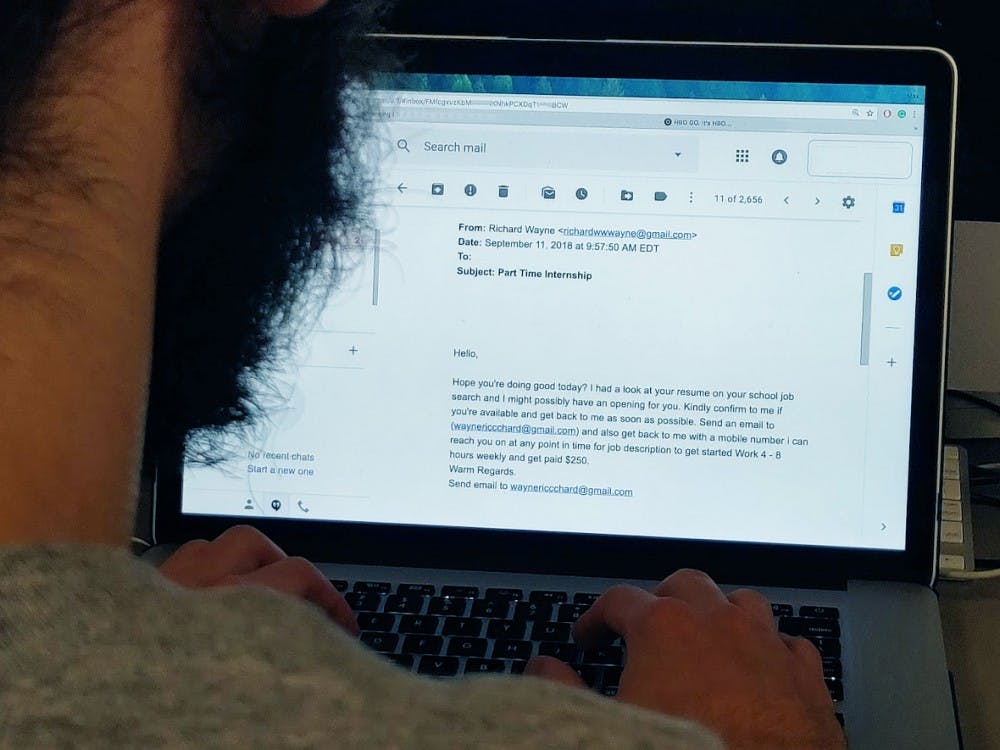Students are receiving an increased number of fake job offers to their UB email accounts, which are potentially jeopardizing their financial and personal information, according to UBIT.
The emails are typically generic, unsolicited, include spelling and grammar errors and offer an unrealistic amount of money for a few hours of work a week. The people who send the emails often don’t provide what company they work for and don’t include job descriptions or specifics, according to Blake Cooper, IT communications specialist.
UBIT could not provide how many students are being affected by the scams, but said students have reported an unusually high amount of emails offering fake jobs.
Scammers often target freshman and international students, who are less familiar with the ways of the workplace and more likely to fall for a fake job offer, Cooper said.
To combat the rise in job scams, UBIT said it will send out emails in the coming weeks educating students about the danger of scam emails.
UB has warned students about the dangers of phishing –– an attempt to collect an individual’s online banking, credit card or login information –– in the past, but Cooper said job scams are different.
“Phishing is an attempt to get your info but jobs scams seem to be about money, which is newer,” Cooper said.
“It’s very unnerving. It’s about the anxiety of getting a job. Students need money and the whole end goal of school is employment. These emails promise trial-based jobs that could lead to something full-time in the future. When you dangle that in front of a freshman’s face, or an international student looking for an opportunity that will allow them to stay in the country, they’re often successful.”
Some scammers ask students to handle, transfer or spend their own money on things like office supplies, with the promise of a reimbursement check once they receive them in the mail. After sending the fake company supplies or money, students never hear from them again, losing out on their savings.
A student forwarded The Spectrum a fake job email he received from “Richard Wayne.”
It reads: “Hope you're doing good today? I had a look at your resume on your school job search and I might possibly have an opening for you. Kindly confirm to me if you're available and get back to me as soon as possible. Send an email to [...] and also get back to me with a mobile number i can reach you on at any point in time for job description to get started Work 4 - 8 hours weekly and get paid $250.”
Scammers will leave emails like this as generic as possible, allowing them to send it out to thousands of students at once. The poor sentence structure, punctuation and lack of a job description should be a red flag for students.
Cooper said if students didn’t apply for a job and randomly receive an email offering unrealistic amounts of money, they shouldn’t believe the hype.
If a job offer threatens students in any way, they should ignore it, Cooper added. He said scammers will often try to intimidate students into sending them money, similar to IRS calls intimidating people into providing their personal information.
“It sounds like they’ve specifically targeted UB students. It’s very fear and greed motivated,” Cooper said. One email said ‘If you don’t send me money by [a certain time] you’ll face [a consequence].’”
If a student falls victim to one of these scams, it can be difficult to retrieve their money. Often times scammers will have students wire them money using untraceable methods, ensuring a successful scam.
Catherine Ullman, UB’s senior information security analyst, said there are steps students can take if they think they fell for a scam.
“[First and foremost,] protect yourself by stopping any further communication,” Ullman said in an email. “Change any passwords on accounts that were involved in the scam, contact any financial institutions involved and make a report to your local law enforcement. If you are a member of the University at Buffalo, contact University Police [and] file a complaint at the Internet Crime Complaint Center.”
Students said they receive scam emails often and, despite flagging them as spam, are still contacted by fake job recruiters.
Lucas Furlow, a junior psychology major, said he gets scam emails every now and then, but has never paid any attention to them. After learning about the increase in scam emails, he said he plans on being extra cautious for any offers that seem too good to be true.
“They’re kind of annoying and I noticed this year that there are more,” Furlow said. “I never responded, but if people are losing their info, it sucks. UBIT should be sending out emails or putting up posters to make sure students know not to fall for these emails.”
Other students said they’ve been bombarded with scam emails that are looking to pay them ridiculous amounts of money for a part-time job.
Anthony Hong, a freshman computer science major, said he receives spam emails almost daily. He hasn’t responded to any but is concerned by the sheer volume of emails in his inbox.
“I do notice that I’ve been getting these phony emails and texts, but I guess I sort of had prior experience with these types of emails, so I tend to ignore them,” Hong said. “I think they’re so popular with college students because so many students are so focused on money –– whatever’s available, they’ll jump at. I think just spreading more awareness of the situation would really help a lot.”
UBIT is holding an Information Security 101 training for students on Oct. 18 in 310 Silverman from 4 to 5 p.m.
Max Kalnitz is the senior news editor and can be reached at max.kalnitz@ubspectrum.com





